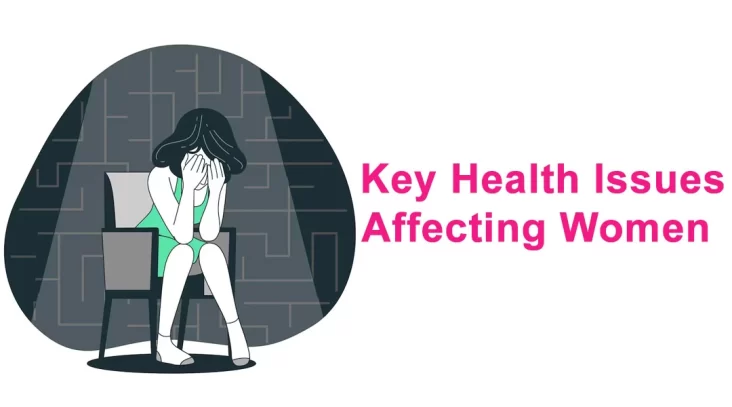Women’s Health: Key Issues and Preventive Measures
Women’s health is a multifaceted aspect of healthcare that encompasses physical, mental, and social well-being. Despite significant strides in healthcare, women still face unique challenges and health disparities globally. Addressing these issues requires a comprehensive approach that emphasizes prevention, education, and access to quality healthcare services. In this article, we’ll explore some of the key health issues affecting women and discuss preventive measures to promote better health outcomes.
Key Health Issues Affecting Women
- Reproductive Health: Reproductive health encompasses a range of issues including menstruation, fertility, contraception, pregnancy, childbirth, and menopause. Access to reproductive healthcare services, including family planning, prenatal care, and maternal health services, is crucial for women’s overall well-being. Lack of access to these services can lead to unintended pregnancies, maternal mortality, and reproductive health complications.
- Breast Health: Breast cancer is one of the most prevalent cancers among women globally. Early detection through regular breast self-exams, clinical breast exams, and mammograms can significantly improve outcomes. Additionally, awareness campaigns promoting breast health education and access to screening services are essential for early detection and treatment.
- Cardiovascular Health: Cardiovascular disease is often perceived as a men’s health issue, but it’s a leading cause of death among women worldwide. Risk factors such as high blood pressure, high cholesterol, diabetes, obesity, and smoking contribute to cardiovascular disease. Preventive measures include adopting a healthy lifestyle with regular exercise, balanced diet, smoking cessation, and managing risk factors through regular health check-ups.
- Mental Health: Women are disproportionately affected by mental health disorders such as depression, anxiety, and eating disorders. Sociocultural factors, hormonal fluctuations, life transitions, and traumatic experiences can contribute to mental health challenges in women. Prevention involves promoting mental health awareness, reducing stigma, providing access to mental health services, and fostering supportive environments.
- Sexual and Reproductive Rights: Women’s sexual and reproductive rights, including access to contraception, safe abortion services, and comprehensive sexuality education, are essential for their autonomy and well-being. Ensuring reproductive rights empowers women to make informed choices about their bodies, health, and future.
- Sexually Transmitted Infections (STIs): Women are particularly vulnerable to STIs such as HIV/AIDS, HPV (human papillomavirus), chlamydia, gonorrhoea, and syphilis. Prevention strategies include practising safe sex, using condoms, getting vaccinated against HPV, and regular STI screenings.
- Gender-Based Violence: Gender-based violence, including domestic violence, sexual assault, and intimate partner violence, is a pervasive public health issue that disproportionately affects women. Prevention efforts involve promoting gender equality, raising awareness, providing support services for survivors, and holding perpetrators accountable.
Preventive Measures
- Health Education and Awareness: Empowering women with knowledge about their bodies, health risks, and preventive measures is crucial. Health education initiatives should cover topics such as reproductive health, breast self-exams, healthy lifestyle habits, mental health awareness, and sexual and reproductive rights.
- Regular Health Screenings: Routine health screenings and check-ups are essential for early detection and management of health conditions. Women should undergo regular screenings such as Pap smears, mammograms, blood pressure checks, cholesterol tests, and gynaecological exams as recommended by healthcare providers.
- Healthy Lifestyle Choices: Adopting a healthy lifestyle can significantly reduce the risk of various health conditions. This includes maintaining a balanced diet rich in fruits, vegetables, whole grains, and lean proteins, engaging in regular physical activity, avoiding tobacco and excessive alcohol consumption, managing stress, and getting an adequate amount of sleep.
- Access to Healthcare Services: Ensuring access to affordable, quality healthcare services is critical for women’s health. This includes reproductive healthcare services, maternal health services, preventive screenings, mental health services, and treatment for chronic conditions. Efforts to improve healthcare access should address barriers such as cost, transportation, language, and cultural sensitivity.
- Advocacy and Policy Change: Advocating for policies that prioritize women’s health and rights is essential for creating systemic change. This includes policies that support reproductive rights, promote gender equality, address gender-based violence, provide funding for women’s health programs, and expand access to healthcare services.
- Community Support and Resources: Building supportive communities and networks can provide women with the resources, information, and emotional support they need to prioritize their health. Community-based organizations, support groups, and online forums can serve as valuable sources of support and information.
In conclusion, women’s health encompasses a wide range of issues that require attention and action at individual, community, and societal levels. By addressing key health issues through preventive measures such as health education, regular screenings, healthy lifestyle choices, access to healthcare services, advocacy, and community support, we can promote better health outcomes and empower women to lead healthier lives.

